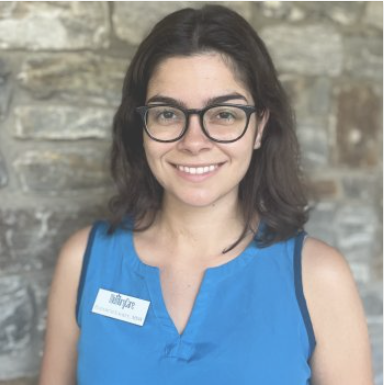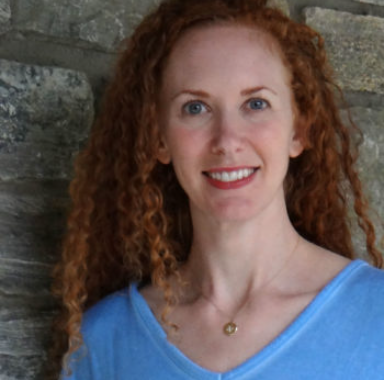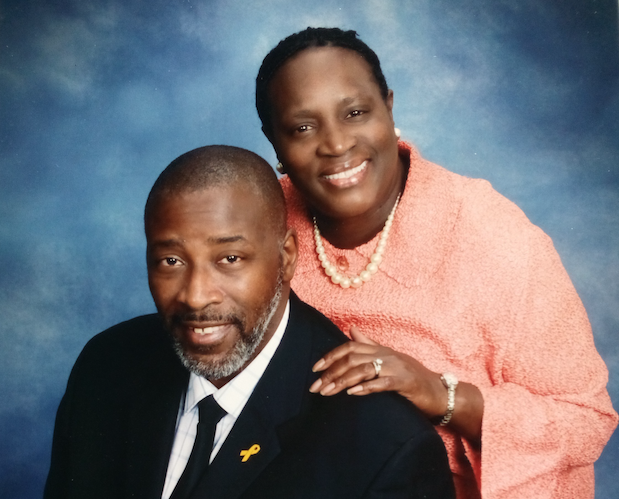In 2004, Joyce Robinson and her siblings watched as their mother was diagnosed with dementia. “We struggled with it because we had never seen this before,” Joyce recalls. “We saw the effect it took on the family.” They cared for their mother until she died in 2012.
In 2018, Joyce’s father-in-law also was diagnosed with dementia. He died in 2019. Joyce and her husband, Vernon Robinson, moved from Beaufort, S.C., to Asheville to retire that same year.
The Robinsons’ experiences, and what they describe as a lack of dementia-related support services in Beaufort, led them to start a nonprofit in Asheville for caregivers of loved ones with dementia called Dementia Partners AVL. The couple host twice-monthly support groups, as Vernon puts it, “to be a beacon of light for one another as we come together to share and give support for loved ones with this disease.” An average of 10 people attend each meeting. (For more information about Dementia Partners AVL, contact dementiapartnersavl@gmail.com.)
According to the Dementia Friendly WNC, there are approximately 20,000 people with dementia living in Western North Carolina. But dementia affects even more people: the loved ones who provide unpaid work as caregivers and like the Robinsons, are suddenly coping with cognitive impairments in people they’ve known their whole lives.
Navigating a dementia diagnosis in the family can be a confusing and lonely experience for both the patient and the caregiver. In Buncombe County, there are numerous nonprofits to provide education and support.
Different diagnosis, different prognosis
Dementia itself is not a disease. Rather, “dementia” refers to the general memory loss, cognitive impairment and lack of problem-solving ability in aging individuals, according to the Centers for Disease Control and Prevention.
“Dementia is an umbrella term for many different types of cognitive impairment — it could be Alzheimer’s disease, vascular disease, a mixture of those [or] a different type of dementia altogether,” explains Elizabeth Lackey, lead care manager at MemoryCare, an Asheville-based nonprofit that provides support for individuals with dementia and support for their caregivers. “Each diagnosis comes with a different prognosis and a different picture of what’s going to happen in the future.”
As people age, they forget names or retell stories. However, the signs of dementia are different because they impact daily life, Lackey says. This includes repeatedly asking the same questions, misplacing items, getting lost in familiar places and having difficulty with functional tasks like cooking.

A long-term study published in October in the journal Neurology found that one-third of individuals ages 65 and older have dementia or mild cognitive impairment. (Mild cognitive impairment is in between the expected changes to memory with aging and the more serious signs of dementia, the Mayo Clinic explains.)
The study also found prevalence rates were similar by gender, but dementia was more prevalent in Black individuals. Mild cognitive impairment was more prevalent in Hispanic people, compared with White people.
‘Ample time with families’
The nonprofit MemoryCare, which has an office at Givens Estates Retirement Community and a satellite office in Waynesville, helps families assess the degree of memory impairment and establishes a care plan. After a doctor’s referral to MemoryCare, the patient is assigned to a team composed of a social worker and a doctor for an initial meeting that can last three-four hours.
The social worker conducts cognitive testing with the patient to assess “what domains of memory, attention, focus — all the things that make up our cognitive processes — may be impaired on a clinical level,” Lackey explains.
The doctor then interprets that testing, performs a basic neurological exam and provides a diagnosis. From there, the social worker guides the patient and family members to available resources and educates them on how dementia may progress, Lackey explains. Patients and families follow up with MemoryCare with three-four appointments each year, which allows the care team to adjust resources as needed.
Dr. Amy Cohen, a geriatrician with MemoryCare, appreciates the positive effect she’s able to have on patients’ lives and the bonds they create. “I’m given ample time with families,” she says, explaining that caregivers are often relieved “to hear all of these things that they’re seeing are linked to a diagnosis” and that there is help available.

“Money is never a reason why a person can’t come here,” Cohen continues. According to MemoryCare’s website, health insurance reimbursements cover only about one-fourth of clinical costs. Families are asked to contribute for care, but the nonprofit offers payment schedules and fee waivers. In 2020, the nonprofit reports it waived 26% of caregiver fees.
Communication difficulties
Another local group, Dementia Friendly WNC, raises awareness among the public about dementia. It is a volunteer-run, grassroots group, not a nonprofit.
Effective communication is an important skill not only for dementia patient caregivers but for anyone who may interact with a person with dementia, like a bank teller, says steering team member Telle King. The group recently provided an educational session to the bus drivers at Asheville Rides Transit as well.
Dementia Friendly WNC provides free dementia awareness educational sessions to businesses and faith communities where it explains how people with dementia can be independent enough to run errands, but they might be slower asking for what they need and be easily disoriented.
The group recommends that businesses display clear signage that is visible from all heights (so it can be read by an older person in a wheelchair), keep bright lights, music and noise to a minimum and remove obstructions like unpacked boxes or shopping carts clear from aisles, King says.
She also recommends that businesses provide a quiet seating area where people with dementia can collect themselves when feeling overwhelmed.
Choices, choices
“Our resources in this area are extremely robust,” says Council on Aging of Buncombe County Executive Director Heather Bauer. “We are very fortunate to have the services we do.” In fact, resources are so diverse, she continues, that the myriad options can be confusing to navigate.
“More is not always better, especially when there is confusion,” Bauer says. “Too many choices can be just as problematic as not having enough choices.” The Council on Aging of Buncombe County can help people with dementia and caregivers to narrow down their options and find the right care.
For caregivers, this can mean support groups, which are held several times each month, or respite care via an adult day care to allow the caregiver a break. For people with dementia, care can include food delivery, minor home repairs and several dining sites that provide exercises, games and socialization. (Council on Aging of Buncombe County services are available to anyone who meets eligibility requirements, not only those with dementia.)
Life doesn’t end
Local dementia experts anticipate that services, though robust, need to be strengthened in coming decades, as Buncombe is an aging county. According to a county aging profile published by the N.C. Department of Health and Human Services, 56,767, or 21%, of the county’s residents were ages 65 and older in 2020. That age group is projected to increase by 49.3% by 2040 to 84,765 people.
Above all, those who work in dementia nonprofits want to reduce the stigma around dementia and promote the dignified and respectful treatment of people with dementia. “People who live with dementia, their life doesn’t end with the diagnosis of dementia,” says King from Dementia Friendly WNC. “They still want to be involved and live as full a life as possible.”
Cohen, the doctor with MemoryCare, says that acquaintances sometimes comment that her job working with people experiencing dementia must be sad or difficult. Instead, Cohen tells Xpress, she finds it rewarding to work with people during this stage of life’s journey.
“I hear amazing stories,” Cohen recalls. “There still is a person behind all these diagnoses. There’s still a person in there who’s lived a whole life and created great things in the world.”
CORRECTION: This article has been updated to correct the email for Dementia Partners AVL.




Before you comment
The comments section is here to provide a platform for civil dialogue on the issues we face together as a local community. Xpress is committed to offering this platform for all voices, but when the tone of the discussion gets nasty or strays off topic, we believe many people choose not to participate. Xpress editors are determined to moderate comments to ensure a constructive interchange is maintained. All comments judged not to be in keeping with the spirit of civil discourse will be removed and repeat violators will be banned. See here for our terms of service. Thank you for being part of this effort to promote respectful discussion.